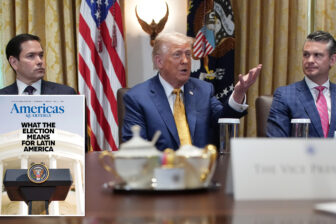BUENOS AIRES—In debates over European strategic autonomy, Latin America is either missing or casually folded into the vague construct of the “Global South.” Europeans played a central role in shaping this concept, a framework that may have held some relevance in the post–Cold War era but now constrains strategic imagination and obscures Latin America’s potential as a stabilizing partner for Europe and the broader West.
Europe has failed to include Latin America as part of its security and defense strategy, prioritizing instead the social and cultural dimensions of the relationship. The stalled EU-Mercosur agreement, the preference for bilateral approaches, patronizing undertones of cooperation, and the absence of a comprehensive vision have created a vacuum—one increasingly filled by China, Russia, and Iran. These nations are not just building influence but actively leveraging it to challenge Western interests.
On July 15, NATO Secretary General Mark Rutte warned from Washington that Brazil, along with fellow BRICS members China and India, could face secondary sanctions from the U.S. if it does not pressure Vladimir Putin to stop the war in Ukraine. Tensions emerged with Colombia, a NATO global partner since 2017, when on July 16 President Gustavo Petro questioned his country’s partnership with the bloc during a summit on Gaza in Bogotá, stating “We must leave NATO; there is no other way.”
Recent frictions aside, Europe still largely sees Latin America through the lens of development aid, democratization programs, liberal good intentions, and environmental protection. From a security perspective, the region is primarily associated with drug trafficking, human and natural resource smuggling, human rights violations, and migration. While these concerns are real, they overshadow the fact that Latin America continues to offer what the West needs most: stability, resources, and shared interests.
Strategic clarity requires moving toward a genuine security partnership between Europe and Latin America: It’s time to consider a renewed transatlantic alliance.
Reviving a longstanding relationship
This would not be the region’s first transatlantic role. During both World Wars, Latin America supported the Allies with food, raw materials, and maritime patrols across the South Atlantic. Brazil, Argentina, Uruguay, and Chile provided critical protein supplies and helped secure key shipping lanes. Brazil also sent troops to the European Theater.
Then, Latin America was seen as a strategic partner. Today, Europe’s main initiative for Latin America, the Global Gateway, is focused on development, not defense. If it truly wants strategic autonomy, Europe must recognize Latin America not as part of the Global South, but as a fellow Atlantic actor. This means building a real agenda for defense and security cooperation, especially in the South Atlantic.
Limited initiatives, such as maritime coordination with Colombia, fall far short. A stronger approach will need renewed engagement from traditional partners like Germany, France, the UK, Italy and Portugal. Spain, once a diplomatic bridge to the region, has seen its influence fade in areas such as arms sales.
If the West is serious about reducing dependence on authoritarian regimes, it must engage Latin America, particularly for energy security, and take advantage of new offshore oil developments and shale reserves. The region is also a key source of lithium, copper, hydrocarbons and rare earths, and is a top agricultural producer.
If strategic autonomy means, for Europe, a greater role in European defense within the confines of NATO—but with its own identity, military capabilities, and the ability to maneuver independently in specific crises—then Latin America should be its primary source of support to sustain that strategy.
A shifting geopolitical landscape
Recent geopolitical signals should serve as a warning. The Monroe Doctrine is dead, and Latin American reactions to the war in Ukraine reveal growing discomfort with Western narratives. Some governments blamed NATO for the conflict; others feared Russian retaliation if they supported Ukraine. Russian disinformation campaigns have targeted local media and civil society, amplifying anti-Western narratives, and Russia has sought alliances with autocratic regimes in the region, such as Venezuela, Cuba, and Nicaragua. BRICS rhetoric of an alternative international order is gaining traction in decision-making circles and academic institutions.
With that trend in motion, China has become increasingly active in the region, pursuing long-term influence through infrastructure, trade, technology, and arms sales. As many as 22 Latin America and Caribbean countries are part of the Asian giant’s Belt and Road Initiative. Iran is quietly rebuilding clandestine networks for asymmetric operations. These nations’ presence is not symbolic—it is expanding, coordinated, and disruptive.
Moreover, two of the Americas’ key maritime choke points—the Northwest Passage and the Panama Canal—are increasingly vulnerable. That leaves the Strait of Magellan and the Drake Passage as the last free and open choke points in the Western Hemisphere. In any future conflict, these critical maritime corridors could be essential to securing global sea lines of communication.
Strategic reset
Argentina is aware of this, and the country’s recent defense reforms reflect a potential shift. Its bid to become a NATO Global Partner, participation in the Combined Maritime Forces, and military modernization with Western technology all signal a clear intent: to keep the Southern Cone and the South Atlantic as open and secure as possible.
In a world shaped by systemic competition and contested influence, the West cannot remain fragmented. Transatlantic unity is not a relic of the past—it is a necessary foundation for the future. Recognizing Latin America as a strategic actor is not an act of generosity, but of geopolitical lucidity.
To act on that recognition, Europe must build a strategic roadmap for engagement—one that moves beyond development cooperation to include concrete initiatives in defense, intelligence-sharing, joint training, and maritime security. Key capitals should appoint special envoys for security affairs in the region and deepen ties with Latin American countries already aligned with Western defense standards. Europe must also invest in securing access to critical minerals—such as lithium, rare earths, and copper—through stable, long-term partnerships that benefit both sides.
Expanding institutional dialogues, reinforcing regional infrastructure, and supporting Latin American integration into Euro-Atlantic security frameworks will not only strengthen Europe’s global posture—it will help secure the Atlantic in an era of growing geopolitical volatility.









